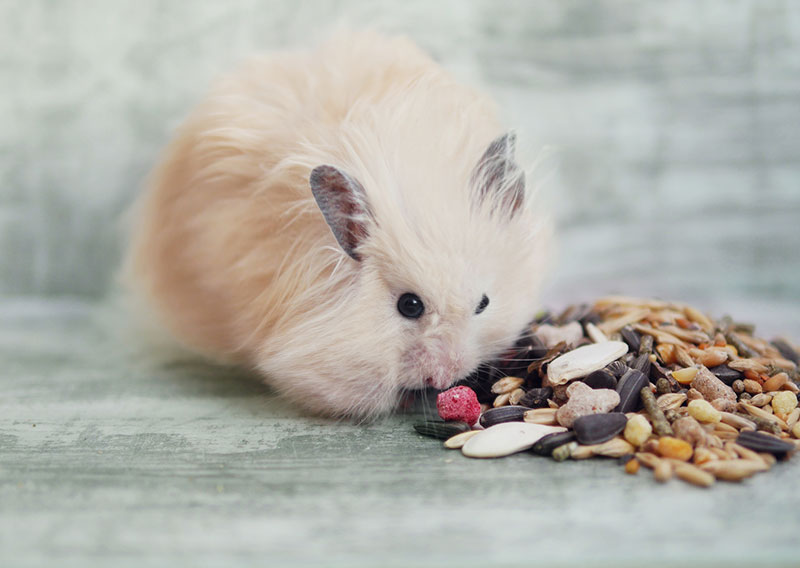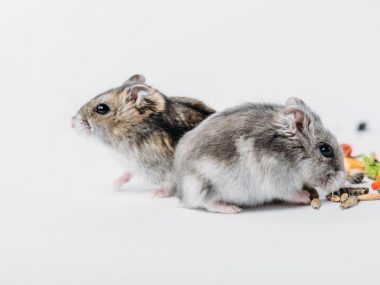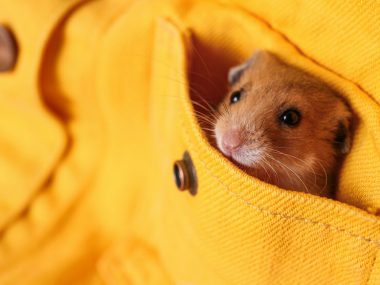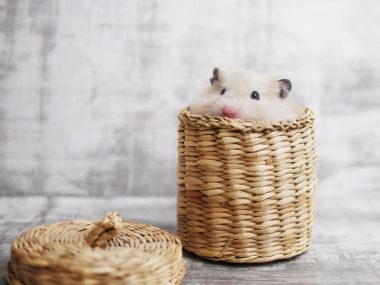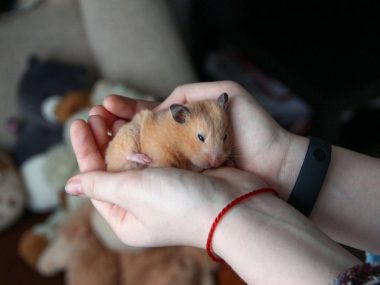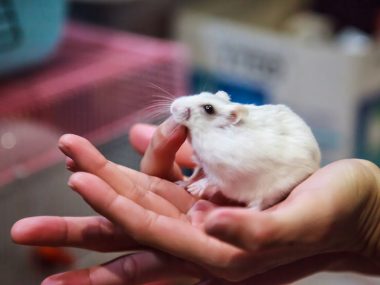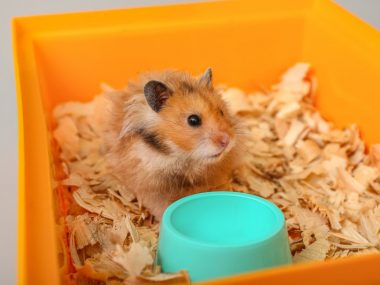Hamsters need a healthy diet and plenty of exercise to stay in tip-top shape. Even though we may adore our little fluff ball’s chubby round shape, being overweight can lead to health problems, and your hamster probably won’t feel very lively and energetic if it is obese.
Hamsters must never be placed on a crash diet to lose weight. Providing a high-quality staple pellet diet and increasing the amount of exercise and stimulation your hamster receives is the best way to encourage the small animal to shed excess weight.
A chubby hamster may be cute, but it isn’t healthy, and the poor little guy won’t feel great being weighed down by a layer of unnecessary fat. Let’s check out what’s normal and how to keep your little hamster sleek and fit.
Table of Contents
Hamster Weight – What Is Average?
Hamsters are not all the same, so if your friend has a chubby-looking hammie and your little fluff ball looks much smaller, they may be entirely different breeds with different physical characteristics. Besides differences in overall size, some hamsters tend to fluff out a little more at the start of winter, and all the extra fluff makes them appear rounder than they are.
Let’s look at the average weight for some popular hamster breeds.
| Breed | Average adult weight | Average length |
| Syrian Hamsters | 4-5 ounces | 6-7 inches |
| Campbell’s Russian Hamsters | Up to 2ozs | 4 inches |
| Winter White Russian Dwarf | 1.27 ounces (females) 1.58 oz (males) (70-90 grams) | 2-4 inches |
| Roborovski Hamster | Around 1 ounce | 1.5-2 inches |
| Chinese Hamster | 1.5 – 2 ounces | 4-5 inches |
| Teddy Bear Hamster | 4-5 ounces | 6-8 inches |
The best way to weigh a hamster is to use a container with high sides. Place hammie inside the container on a food scale. Get the reading and then minus the weight of the empty container.
If your hamster weighs slightly more than the average on the table above, there is no need for concern so long as it is still healthy, curious, and active.
How Will You Know Your Hamster Is Overweight?
If you have owned your hamster for a while, you may notice that the little animal feels slightly heavier than usual. That may not always be bad, especially if winter is around the corner.
Like many other animals, hamsters often adjust their feeding habits according to the seasons and may eat a little more eagerly if they feel a cold spell coming. However, there may be other reasons that your hamster has become chubby and moving around less, including pregnancy or a medical condition like a tumor.
The primary indicator that your hamster is becoming overweight which may lead to health issues is a change in behavior. A hamster that looks chubby and has become lethargic and no longer running about on its wheel or interested in playing may warrant further investigation and attention, especially if you have ruled out conditions like old age or pregnancy.
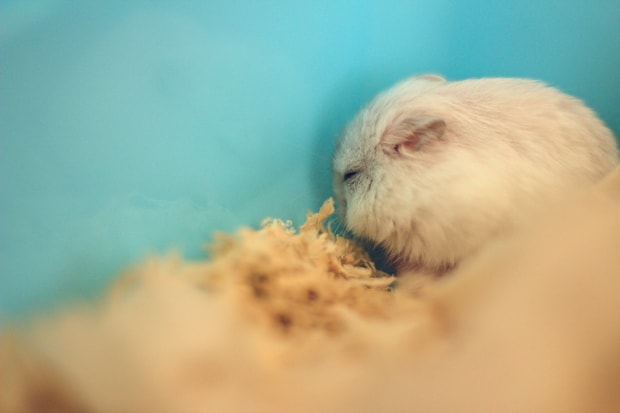
If your hamster is too cold, it will also cause a significant decline in movement, so be sure to go through all possibilities while figuring out why your hamster isn’t getting as much exercise as usual.
Obesity in any animal can lead to more serious issues like diabetes or heart problems. However, before you reduce your hamster’s food, there are far better ways to keep your pet in top athletic form.
Why Is My Hamster So Fat?
There are two major causes of obesity in hamsters—lack of exercise and incorrect diet.
Lack Of Exercise
A wild hamster in its natural environment would wake up from its daytime rest and get out and about exploring and running around at night to forage. These small animals have evolved to cover long distances to search for food.
A hamster living inside a cage does not have the opportunity to move around as much, so it is up to the hammie parent to provide exercise opportunities and toys that will keep your hamster stimulated and interested. Choosing the correct sized cage is one of the most critical factors that may limit your hamster’s activity levels.
Choose a multilevel cage that contains some interesting elements that encourage exercise. Swap out different items in the cage to keep the environment stimulating and get your hamster to move around and explore.
Exercise doesn’t only mean running in a hamster wheel. There are lots of other ways to encourage your hammie to burn calories. Just playing with your hamster or building it a fun maze puzzle will create interest and get it moving while having fun at the same time.
Plenty of hamster toys are available to get your hamster super excited about climbing and burrowing. Interestingly, hamster balls that allow your pet to roll around outside their cage are not always as much fun for the hamster as for the owner, and they could even be dangerous. Stick with items that allow your little fur ball to relax and enjoy exploring.
Incorrect Diet Or Too Many Treats
Feeding your hamster a good quality pelleted hamster food and providing additional supplementary items like fresh fruit and vegetables will rarely result in an obese hamster. According to MedMD, most hamsters require around 1/8 -1/3 of a cup of pellets per day.
Seed mix foods are not recommended. These mixes tend to be high in sugar and fat, and hamsters will also select the seeds they love the most, leading to weight gain and nutritional deficiencies.
The best staple food for your little pets is high-quality pellets that combine all the necessary food elements.
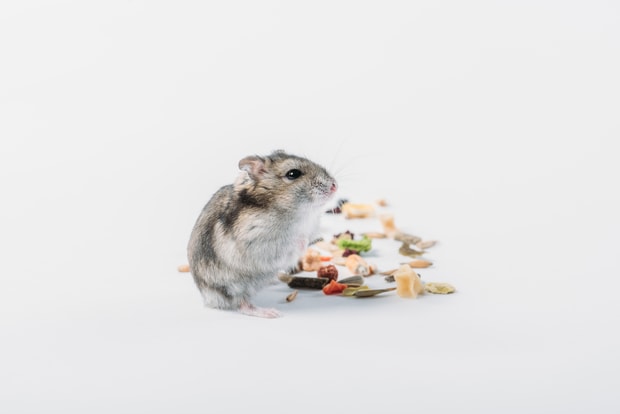
It is pretty unlikely that your hamster will get fat if it is getting enough exercise. Hamsters need to eat small amounts up to 20 times a day (especially at night), but they should also have plenty of opportunities to burn off all the fuel they are consuming.
Should I put My Hamster On Diet?
Never withhold food to try to get your hamster to lose weight. This is not only cruel, but it will have severe negative results both physically and psychologically. Hamsters need to eat frequently to fuel their energetic little bodies, so if your hamster is a little chubby looking, opt for healthier food options but never withhold its meals.
Always ensure there is enough healthy food and plenty of clean water available to your hamster. Your hamster will lose weight faster if it increases its activity level rather than stress about when it will get food again.
Can I Give A Chubby Hamster Treats?
Although your hamster will get a balanced diet from a good quality hamster pellet, you will still want to provide a few extra snacks and treats. This adds variety to the menu and makes the environment more interesting.
Munchies should mainly include tiny slivers of fruit and vegetables. There are plenty of other safe hammie snacks that your little pet will love. Avoid items high in sugar or salt, and always check that snacks are safe for your hamster.
Part of the fun of being a hamster owner is rewarding your little pet with treats – just make sure that they aren’t loaded with unhealthy fats, sugar, or salt. Like any parent, you want your little one to stay happy and healthy!
Frequently Asked Questions
What to do if your hamster is getting fat?
If your hamster is getting fat, it may need more stimulating activities and exercise to keep it busy and interested. Check that the cage is large enough and add some extra elements in addition to a correct size exercise wheel.
Hamsters are naturally curious and active little rodents, and it can be pretty boring sitting in a tiny cage with nothing to do. Set up a maze or an obstacle course with a small food treat at the end. Make sure the little animals have things to climb up and creep through to find their food rather than just adding new food to their bowl each day.
Remember that sudden weight increase may also indicate a medical issue like diabetes, an abscess, or even pregnancy. Always consult with a veterinarian if your hamster suddenly gains weight.
What Foods Make Hamsters Fat?
Hamsters often get a little too chubby when fed a diet of mixed seeds and nuts. Like all kids, they will choose the things they love (which are often not the healthiest) and leave the ones they aren’t too keen on. This causes an imbalance in their diet, so sticking to a high-quality mixed pellet as their staple food is best.
Of course, fresh fruit and vegetables are also important, so long as the amounts are tiny. Fruits, in particular, are often high in natural sugar. Highly processed foods and snacks that contain oil and salt should be avoided.
Can You Overfeed A Hamster?
Hamsters have very high metabolisms. They need to eat a lot of small meals each day to stay healthy, so it would be impossible to only provide food when it is hungry as it would need to be fed every 2 hours. While it is undoubtedly possible to overfeed a hamster too many snacks and treats, it is vital that there your pet always has a supply of high-quality, staple pellets available.
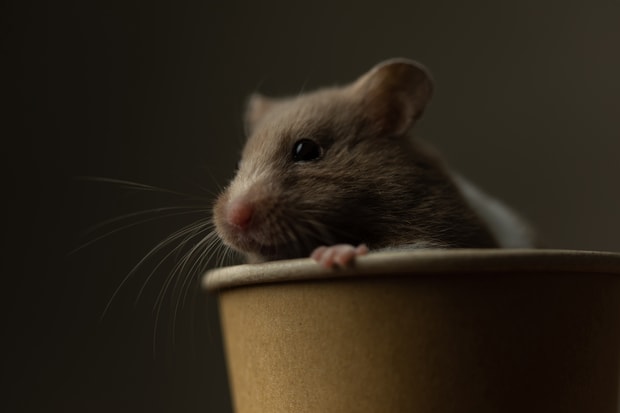
Withholding food from a hamster can be highly stressful and cause physical and psychological problems. Always ensure that there is a steady supply of pellets and plenty of water.
Healthy snacks should be provided as treats to add variety and given as rewards. Weight management in hamsters should focus primarily on increasing physical activity and providing a stimulating environment to keep the little hammie running around.
How Often Should I Refill My Hamsters Food?
On average, a healthy hamster consumes around 12 grams of food each day – that’s between one to two tablespoons of pellets. The amount of food provided should be based on the breed of your hamster. A quality hamster pellet should contain at least 15-20% protein.
Don’t be amazed if you add pellets and find them all missing very quickly after putting them out. Your hamster probably didn’t eat them all immediately. Hamsters tend to carry food off and create little stashes in their hideouts for later. Hamsters must be provided with fresh pellets daily. Remove any wasted food from your hamster’s plate, clean it and add fresh pellets each day. Ensure that there is no mold or filth in the cage preventing your hamster from enjoying its food and running around actively.
References:
https://www.ncbi.nlm.nih.gov/pmc/articles/PMC5543244/
https://www.medvetforpets.com/hamster-information-care-recommendations/
